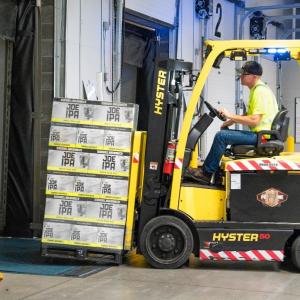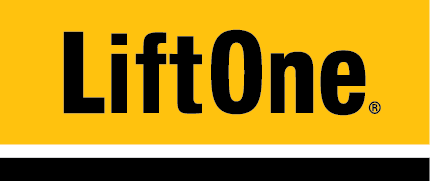
Replacing forklift tires often gets put off much longer than it should. While some maintenance or repair tasks prevent your forklift from running, forklift tires in less than ideal condition pose significant risks to operators and equipment. Continuing to run your equipment on tires that need to be replaced can cause costly damage to your forklift, forks, chains or mast; create stability and safety risks; and increase operator fatigue. Read on to learn when to replace your forklift tires.
Jump to Sections:
- When is it Time to Replace My Forklift Tires?
- 4 Signs Your Forklift Tires Need to Be Replaced
- Factors for Life Expectancy on Forklift Tires
When is it Time to Replace My Forklift Tires?
In addition to checking the fluid levels, battery, and the condition of your hoses, belts and chains, checking your forklift tires should be a part of your daily pre-use inspection. Look closely for the following:
4 Signs Your Forklift Tires Need to Be Replaced
1. Tires worn to the wear line
Many forklift tires have a wear line or a safety line marked on the tire. Over time, with normal use, the rubber on tires will wear down. When you notice your forklift tires are getting close to this line, it’s a good idea to contact your dealer to order new tires.
2. Chunking, tearing, or cracking
Any chunking, tearing, or cracking discovered during your visual inspection indicates an immediate need for replacement. Tires showing this type of damage are unsafe to use and the lift truck should not be operated until the affected tire or tires have been replaced.
3. Flat spots or uneven wear
Flat spots or uneven wear on your forklift tires often indicate that sharp turns have repeatedly been taken under heavy load or aggressive braking. Forklift tires with flat spots or uneven wear should be replaced and the operators should receive operator safety training.
4. Repeat low tire pressure for pneumatic tires
Under inflated pneumatic tires puts your forklift in an unstable position. Low tire pressure on pneumatic tires is typically not an issue that requires tire replacement, but if after reinflation you continue to see low readings, you may have a leak that requires repair or replacement.
Factors for Life Expectancy on Forklift Tires
You’ll want to use the signs above to determine if you need new forklift tires or not. However, if you want to know how to extend the life of your forklift tires. You’ll want to take these factors into consideration.
1. Usage of Tire
Unlike tires on regular vehicles, forklift tire’s durability is dependent on the number of hours they are operated rather than the number of miles the forklift is driven. This means if you only use your forklift 10 hours a week, your tires will last significantly longer than if you are using it constantly 40 hours a week.
2. Driving Habits of Operator
The driving habits of the operator of the forklift have a direct impact on the life expectancy of your forklift tires. If the driver is making quick stops or sharp corners, the life of the tires will be minimized. In addition to this, driving the forklift too fast or spinning the tires can also wear them out sooner resulting in a need for new tires sooner.
3. Conditions of the Floor
Driving your forklift on rough and hazardous surfaces can decrease the life of your forklift tires significantly. Be sure to remove any debris from your floors to make the driving surface safe. By keeping your floor surface clean and smooth, you can extend the life expectancy of your forklift tires and save money.
4. Conditions of the Jobsite
Another factor to be aware of is the conditions of your jobsite. If the worksite is indoor and the facility tends to get very humid, watch out for condensation that can settle on the floors. This can cause the tires to spin out which, as we mentioned previously, can put additional wear on them.
5. Type of Tire
The type of forklift tire also plays an important role in life expectancy. If you are using pneumatic tires, they will tend to wear out faster. They also have a greater chance of needing replacement as they can be punctured and deflate. The other tire option is solid polyurethane tires. These can last up to twice as long as pneumatic tires but aren’t as well suited for indoor use.
If you believe it is time to replace your forklift tires, it is important to trust an expert. They will make sure the job is done right and you’ll be able to fully reap the benefits of proper maintenance on your forklift tires. Not going to a professional can result in more issues that will be more costly in the long run. To avoid this, contact your nearest LiftOne dealership location and our team of experts will find the best tire solution for your fleet.










